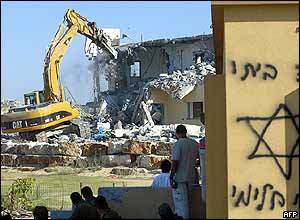Questions Remain After Gaza Withdrawal
This important step in Middle Eastern peace was no easy task, both politically and socially. The process that was suspected to take months has taken a little less than a week. The incoherent bloodshed that was predicted by Israeli hardliners has failed to take place. The last of the 85,000 residents in the 21 Gaza settlements are leaving Netzarim. Though the 600 residents and unknown sympathizers held up for hours in a Netzarim synagogue under a life-size menorah, the 2,000 Israeli troops were able to evacuate and dismantle the settlement today.
As Israel nears the end of its Gaza Withdrawal plan, the world's attention turns to the West Bank. 2 of the 4 West Bank settlements have already withdrawn, but over 2,000 extremists (mostly non-residents) have set up base in the remaining two: Sanur and Homesh. Some 5,000 troops have been redeployed from Gaza to the West Bank in fear of greater resistance. This was confirmed yesterday when eight masked Jewish extremists attacked an army tractor near the settlement of Kedumim, slashing its tires and setting it on fire while a soldier was still in the vehicle. Just a day earlier, a 100 or more protestors attacked army bulldozers in Sanur as they attempted to level the evacuation staging area.
The mainstream media seems more concerned with the withdrawal process itself than the aftermath. The reason behind these drastic actions involve the future of the Palestinian state, but yet the focus is instead on Israel's unilateral withdrawal. Meanwhile, Palestinian Leader Mahmoud Abbas is still struggling against his own radical group Hamas in planning the future of Gaza. Though currently agreeing to a ceasefire during the evacuation, Hamas leaders have both taken credit for Israel's disengagement and vowed to continue armed resistance to reclaim all of Palestine. A spokesman for Hamas had this to say in Gaza City:
Gaza is not Palestine. As for Jerusalem and the West Bank, we will seek to liberate them by resistance just as the Gaza Strip was liberated.These security concerns aside, many economic and property issues plague the Palestinian government. As Daoud Kuttab points out in his article at TomPaine.com, Israel, Palestine and other countries like the US and Britain need to move beyond the unilateral actions of Ariel Sharon into a multilateral model of discussion and lasting peace. Despite the political expediency given to both Abbas and Sharon, a single nation alone cannot dictate the peace:
[T]he day after the completion of the Gaza withdrawal, Israelis and Palestinians will be confronted with important unresolved questions. There is no doubt that the evacuation of Jewish settlers in areas that Israelis consider part of their God-given territory represents a huge ideological reversal. But after years of preaching and practicing one of Zionism's main tenets, will the removal of settlements continue in the West Bank, or will this be a one-time exception?I can only hope the US has learned its lesson in Iraq: freedom and democracy cannot be brought by unilateral force and occupation. Only through multilateral negotiation and compromise can any lasting peace exist between Israel and Palestine.
Palestinians, for their part, will be expected to answer questions - in deeds, not just in words - about their ability to build a modern pluralistic state. How will the Palestinian body politic deal with the growing power of the Islamic movements that undoubtedly will expect a significant share of power in post-withdrawal Gaza?
The international community also will have to answer some key questions. According to the Palestinian Economic Council for Reconstruction and Development, annual per capita income in Gaza continues to average roughly $700, while Israelis enjoy incomes averaging a $16,000 per capita. In the absence of relatively well-paying jobs, what will happen to the lines of unemployed Gazans? The potential flight of employment seekers - a formidable force worldwide - is only one problem. More immediately, if Gazan families are not well fed, the recurrence of cross-border violence, if not the eruption of a third intifada, will only be a matter of time.
While the economic situation in Gaza is a critical issue, the future of the Palestinian-Israeli conflict will be determined mainly by the next steps in the peace process. Permanent-status issues concerning borders, the West Bank, Jerusalem, and refugees must be dealt with bilaterally. Any serious observer of the Palestinian-Israeli conflict will no doubt acknowledge that there can be no unilateral solution to these issues.


0 Comments:
Post a Comment
<< Home